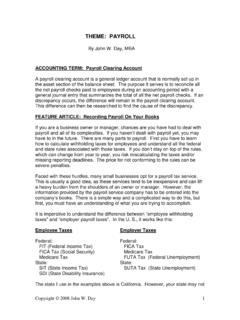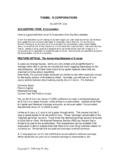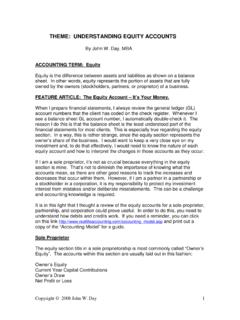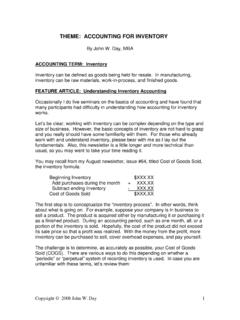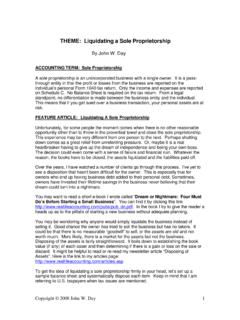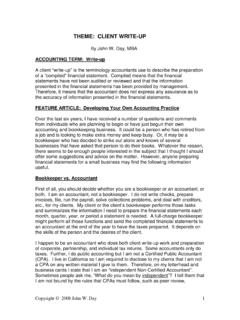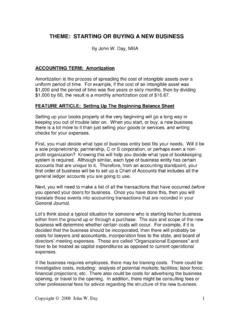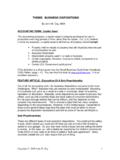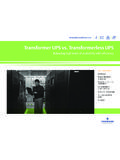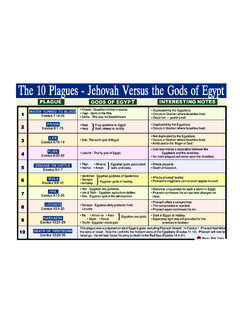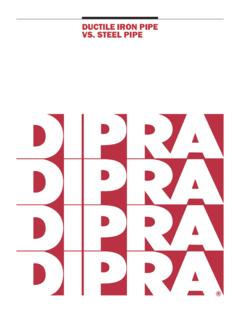Transcription of THEME: CPAs vs. NON-CPAs - Real Life Accounting
1 Copyright 2008 John W. Day 1 THEME: cpas vs . NON-CPAs By John W. Day, MBA Accounting TERM: Certified Public Accountant (CPA) In the United States a Certified Public Accountant (CPA) is a person who has been licensed by their State Board of Accountancy to practice public Accounting The following article focuses on policy. Other countries have equivalent Accounting organizations, education standards, and other requirements for certification. For instance, Canada certifies accountants under two categories; (1) Certified General Accountants (CGA), and (2) Certified Management Accountants (CMA). FEATURE ARTICLE: cpas vs . Independent Non-Certified Accountants I wish I had a nickel for every time someone asked me what the difference is between CPAs and non-certified accountants. Essentially, non-certified accountants can simply hang up their shingle and open their doors for business.
2 There are no educational requirements. If they want to prepare taxes, most states require a certain number of qualified hours of study plus continuing education hours each year. By contrast, CPAs have usually majored in Accounting in college; sat for CPA exams covering theory, practice, auditing, and law; worked for an established Accounting firm for two years; and, acquired five hundred hours of auditing time to earn their certification. In addition, they are required to complete a certain number of hours of continuing education to maintain their license. Whoa! Why is it that one individual has to go through rigorous testing and on-the-job training to become certified to practice Accounting and another can practice Accounting without any formal training? It has to do with the concept of free enterprise . Remember the old adage, Caveat Emptor ? It means, Let the buyer beware.
3 In other words, it is the buyer s responsibility to choose a qualified professional. But, there are some legal restrictions that define the range of services that can be performed for certified and non-certified accountants. For instance, there are three main types of financial statements that can be prepared by accountants: (1) audited, (2) reviewed, (3) compiled. Only a CPA can prepare an audited financial statement. This process requires the CPA to methodically examine and test the financial records of a company. A report is then issued by the auditing accountants stating whether they found the information contained in the financial statements to be presented fairly, in all material respects. Copyright 2008 John W. Day 2 In addition, only a CPA can prepare a reviewed financial statement. The review process is less involved than an audit but some testing is done to verify information.
4 The CPA issues a report describing the scope of the review, its limitations, and findings. Both CPAs and non-certified accountants, including bookkeepers, can prepare compiled financial statements. A report is issued with compiled statements indicating that no auditing or review methods were used and that the financial statements were compiled using information provided by management. This means that, if you want to have your financial statements audited or reviewed, you must have a CPA perform that work. Obviously, those services cost more than a compiled financial statement. Your circumstances may dictate a need for such services. For example, it may be a requirement for a bank loan to have your financial statements audited. Or, other partners or stockholders may insist that the books be audited or reviewed in order for them to feel secure in their investment. Usually, these are businesses that have a substantial net worth.
5 Most small businesses will never need to have their financial statements audited or reviewed. Market conditions have brought on the use of non-certified accountants because, characteristically, CPAs charge more for their services than non-certified accountants and bookkeepers. CPAs are also bound to follow precise standards when preparing financial statements, driving their costs higher. They have to conform because the State Board of Accountancy (regulatory agency that issues the certificates) periodically reviews their work and, if certain procedures are not followed, the practitioner s license could be put in jeopardy. At the same time, many small businesses have limited funds, so naturally seek ways to save on Accounting fees. Many small business owners do their own books during the year. They then try to get a financial statement prepared as quickly and inexpensively as possible by a professional at the end of the year in order to file their tax returns.
6 A non-certified accountant can prepare a simple financial statement that amply provides the information necessary to file a tax return. This is not to say that non-certified accountants will use any information that is given to them. At minimum, deposits and cash disbursement information should be verified by a bank reconciliation. A good accountant will question the client for some kind of documentation if the figures seem unreasonable. In most cases, banks accept a compiled financial statement, prepared by an outside accountant, whether a CPA or not. This has created the so called turf battles in some states between CPAs and non-certified accountants. These battles have been fought all the way to the states supreme courts. Usually the issue involved is the use of commercial free speech . This is because CPAs don t want NON-CPAs to be able to call themselves accountants.
7 In some cases, they don t want NON-CPAs to be able to even use the word Accounting . In Maryland, CPAs lost the battle. In California, a compromise was reached whereby NON-CPAs are required to disclose that they are non-certified on any literature where Copyright 2008 John W. Day 3 they refer to themselves as an accountant . Bookkeepers are unaffected because it is understood that a bookkeeper is not a CPA. In California, there are approximately 20,000 non-certified, independent accountants. They like to call themselves independent because they are free from the restrictions of the state boards and the American Institute of Certified Public Accountants (AICPA). Most of these 20,000 people also prepare income taxes. The bottom line is that in all professions one finds individuals who provide varying degrees of quality work. All lawyers must past the bar examination. That doesn t guarantee they will be good lawyers.
8 It is no different with CPAs. There are good ones and bad ones. There are expert CPAs and inexperienced CPAs. Obviously, it is the same for non-certified accountants and bookkeepers. It is simply a matter of human nature. QUESTION: Do I Need An Accountant? Does your business needs an outside accountant? It all depends. If you require an audited or reviewed financial statement, then, yes, you need a CPA. In any event, it is always a good idea to maintain a relationship with an accountant no matter how small your business. Whether your accountant is a CPA is up to you. The real question is: To what extent do you need outside Accounting services? That also depends on you and the nature of your business. I always start with the admonition: The Buck Stops With You! You cannot afford to dissociate yourself from understanding the meaning of your financial statements. If you solely rely on your Accounting staff or accountant for completely accurate financial data, then you are asking for trouble.
9 If you are going to own or manage a business, then you have a responsibility to learn how to speak the language of business. The language of business is Accounting knowledge. How involved you become in the Accounting process will be determined by time schedules, your mental pre-disposition, desire for control, cash flow, etc. One scenario, if you can afford it, is to hire an internal Accounting staff to prepare financial statements on a monthly basis and have an external accountant check them over. Another common scenario is to prepare part of the compilation yourself, such as preparing a sales journal and a cash disbursements journal, and then hire an outside accountant to prepare a bank reconciliation and the financial statements for you. Some do this on a monthly basis, others quarterly. Some business owners do the books themselves all year and turn them over to the accountant at the end of the year to verify the balances and do the depreciation entry for tax purposes.
10 There are numerous ways to work with an accountant. Regardless, you should learn enough about Accounting to be able to communicate intelligently with your accountant. Since you are intimately involved in your business you may recognize danger signals that not even your accountant will see. Copyright 2008 John W. Day 4 TIP: How to Select An Accountant. Relying on the yellow pages to find an accountant can be risky. The best way to find any professional is by a referral. However, you need to interview prospective accountants before signing on. One of the first priorities is to find out what their experience level is. Your business may have very specific Accounting and tax issues that require a certain amount of expertise. Perhaps you have a manufacturing concern. What does the accountant know about raw materials, work-in-process, and finished goods inventory Accounting ? Does the accountant know how to set up job-costing and overhead burdens?
